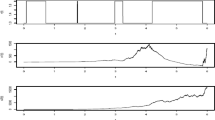Abstract
In this work characterizations of the notion of non-uniform in time robust global asymptotic output stability for hybrid systems with disturbances are given. Based on the provided characterizations, it is shown that every asymptotically output controllable time-varying control system can be stabilized (in general non-uniformly in time) by means of time-varying hybrid feedback.
Similar content being viewed by others
References
Albertini F, Sontag ED (1990) Continuous contol-lyapunov functions for asymptotic controllable time–varying systems. Int J Control 72(18):1630–1641
Ancona F, Bressan A (1999) Patchy vector fields and asymptotic stabilization. ESAIM Control Optim Calculus Variations 4:445–471
Aubin JP, Haddad G (2001) Cadenced runs of impulse and hybrid control systems. Int J Robust Nonlin Control 11:401–415
Clarke FH, Ledyaev YS, Sontag ED, Subbotin AI (1997) Asymptotic controllability implies feedback stabilization. IEEE Trans Automat Control 42(10):1394–1407
Hu B, Michel AN (2000) Stability analysis of digital control systems with time-varying sampling periods. Automatica 36:897–905
Hu B, Michel AN (2000) Robustness analysis of digital control systems with time-varying sampling periods. J Franklin Inst 337:117–130
Ingalls B, Wang Y (2001) On input-to-output stability for systems not uniformly bounded. In: Proceedings of NOLCOS 2001
Karafyllis I, Tsinias J (2003) A Converse Lyapunov Theorem for Non-Uniform in Time Global Asymptotic Stability and its Application to Feedback Stabilization. SIAM J Control Optim 42(3):936–965
Karafyllis I, Tsinias J (2004) Non-uniform in time ISS and the small-gain theorem. IEEE Trans Automat Control 49(2):196–216
Karafyllis I (2004) The non-uniform in time small-gain theorem for a wide class of control systems with outputs. Eur J Control 10(4):307–323
Karafyllis I (2005) Non-uniform in time robust global asymptotic output stability. Syst Control Lett 54:181–193
Kellett CM, Teel AR (2004) Weak converse lyapunov theorems and control Lyapunov functions. SIAM J Contr Optim 46(6):1934–1959
Kolmanovsky I, McClamroch NH (1998) Hybrid feedback stabilization of rotational- translational actuator (RTAC) system. Int J Robust Nonlin Control 8:367–375
Krichman K (2000) A Lyapunov approach to detectability of nonlinear systems. PhD Thesis, Rutgers University
Lakshmikantham V, Bainov DD, Simeonov PS (1989) Theory of impulsive differential equations. World Scientific, Singapore
Ledyaev YS, Sontag ED (1999) A Lyapunov characterization of robust stabilization. Nonlin Anal Theo Meth Appl 37(7):813–840
Malisoff M, Rifford L, Sontag ED (2004) Global asymptotic controllability implies input-to-state stabilization. SIAM J Control Optim 42:2211–2238
Mancilla Aguilar JL, Garcia RA, Troparevsky MI (2000) Stability of a certain class of hybrid dynamical systems. Int J Control 73(15):1362–1374
Marchand N, Alamir M (2000) Asymptotic controllability implies continuous-discrete time feedback stabilization. In: Nonlinear control in the year 2000, vol. 2. Springer, Berlin Heidelberg Newyork, pp 63–79
Morin P, Samson C (1999). Robust point-stabilization of nonlinear affine control systems. In: Aeyels D, Lamnabhi-Lagarrigue F, van der Schaft A (eds). Stability and stabilization of nonlinear systems. Springer-Verlag, London, pp 215–237
Morin P, Samson C (1999) Exponential stabilization of nonlinear driftless systems with robustness to unmodeled dynamics. ESAIM Control, Optim Calc Variations 4:1–35
Prieur C (2000). A robustly globally asymptotically stabilizing feedback : the example of the Artstein’s circles. In: Isidori A et al (eds). Nonlinear Control in the year 2000. Springer-Verlag, London vol. 258, pp. 279–300
Prieur C (2000) Uniting local and global controllers with robustness to vanishing noise. Math Control Signals Syst 14:143–172
Prieur C, Astolfi A (2003) Robust stabilization of chained systems via hybrid control. IEEE Trans Automat Control 48(10):1768–1772
Prieur C (2005) Asymptotic controllability and robust asymptotic stabilizability. SIAM J Control Optim 43(5):1888–1912
Rifford L (2000) Existence of lipschitz and semiconcave control-Lyapunov functions. SIAM J Control Optim 39(4):1043–1064
Savkin AV, Evans RJ (2002) Hybrid dynamical systems. Birkhauser, Boston
Shim H, Teel AR (2003) Asymptotic controllability and observability imply semiglobal practical asymptotic stabilizability by sampled–data output feedback. Automatica 30(3):441–454
Sontag ED (1983) A Lyapunov–like characterization of asymptotic controllability. SIAM J Control Optim 34:124–160
Sontag ED (1989) Smooth stabilization implies coprime factorization. IEEE Trans Automat Control 34:435–443
Sontag ED, Sussmann H (1995) Nonsmooth control Lyapunov functions. In: Proceedings of the IEEE conference on decision and control. New Orleans, pp 2799–2805
Sontag ED (1998) Mathematical control theory, 2nd edn. Springer, Berlin Heidelberg New York
Sontag ED (1998) Comments on integral variants of ISS. Syst Control Lett 34:93–100
Sontag ED (1999) Clocks and insensitivity to small measurement errors. ESAIM Control Optim Calc Variations 4:537–557
Sontag ED, Wang Y (1999) Notions of input to output stability. Syst Control Lett 38:235–248
Sontag ED, Wang Y (2001) Lyapunov characterizations of input-to-output stability. SIAM J Control Optim 39:226–249
Sordalen OJ, Egeland O (1995) Exponential stabilization of nonholonomic chained systems. IEEE Trans Automat Control 40(1):35–49
Tsinias J (2004) Propagating asymptotic controllability through integrators. IEEE Trans Automat Control 49:134–141
Tsinias J (2006) Links between asymptotic controllability and persistence of excitation for a class of time-varying systems. Syst Control Lett (in press)
Tsinias J (2005) A general notion of global asymptotic controllability for time-varying systems and its Lyapunov characterization. Int J Control 78(4):264–276
Author information
Authors and Affiliations
Corresponding author
Rights and permissions
About this article
Cite this article
Karafyllis, I. Stabilization by Means of Time-varying Hybrid Feedback. Math. Control Signals Syst. 18, 236–259 (2006). https://doi.org/10.1007/s00498-006-0001-5
Received:
Revised:
Published:
Issue Date:
DOI: https://doi.org/10.1007/s00498-006-0001-5



